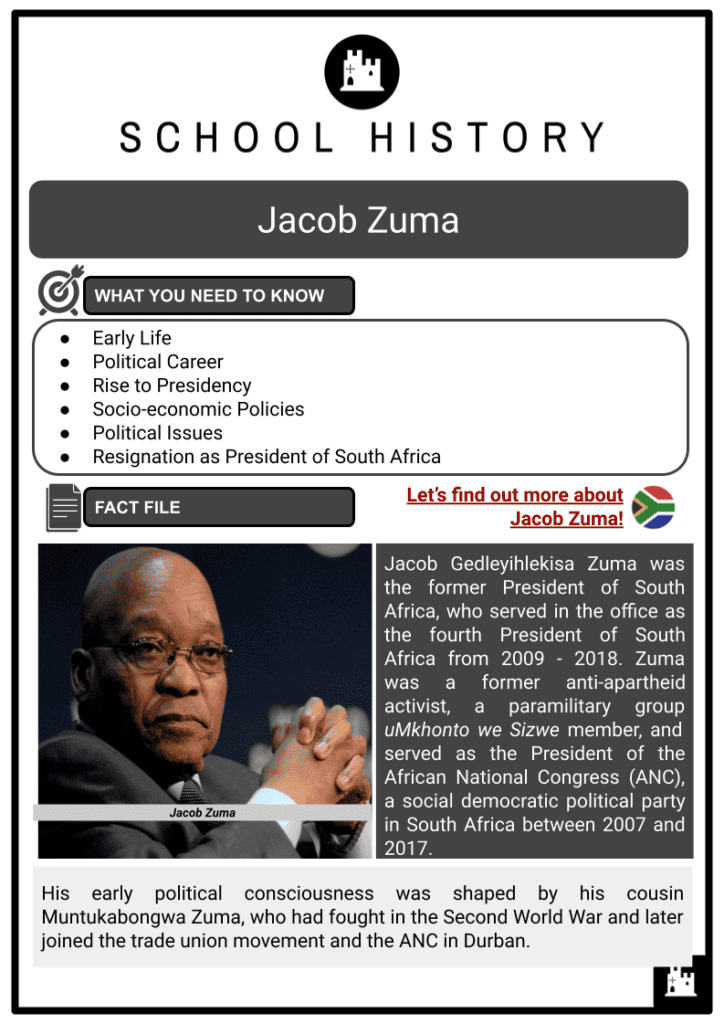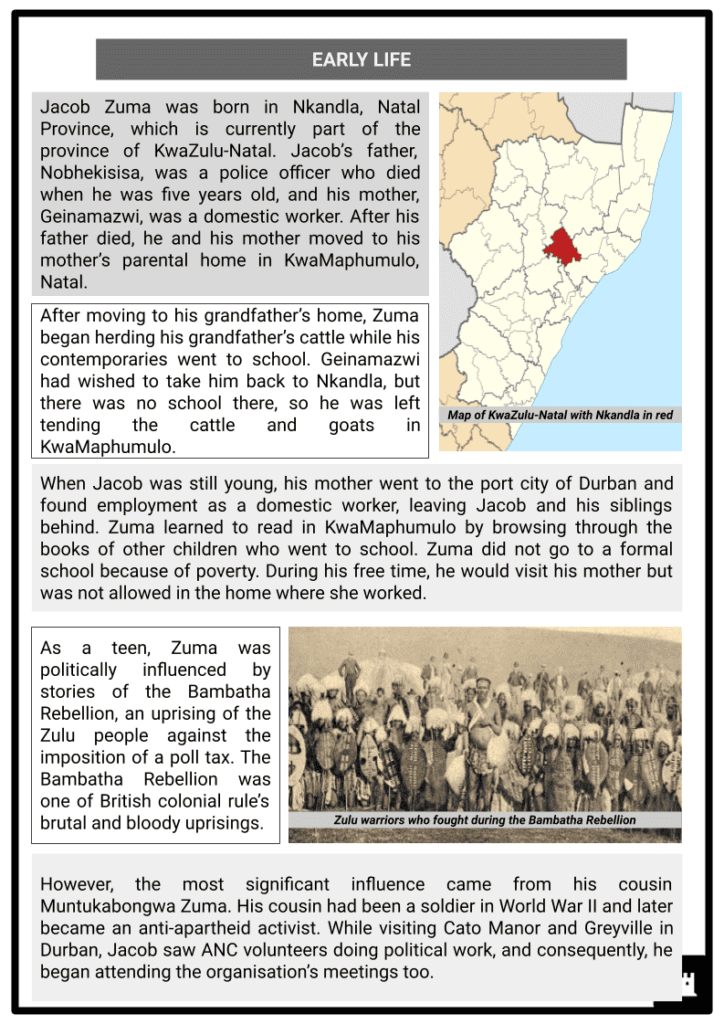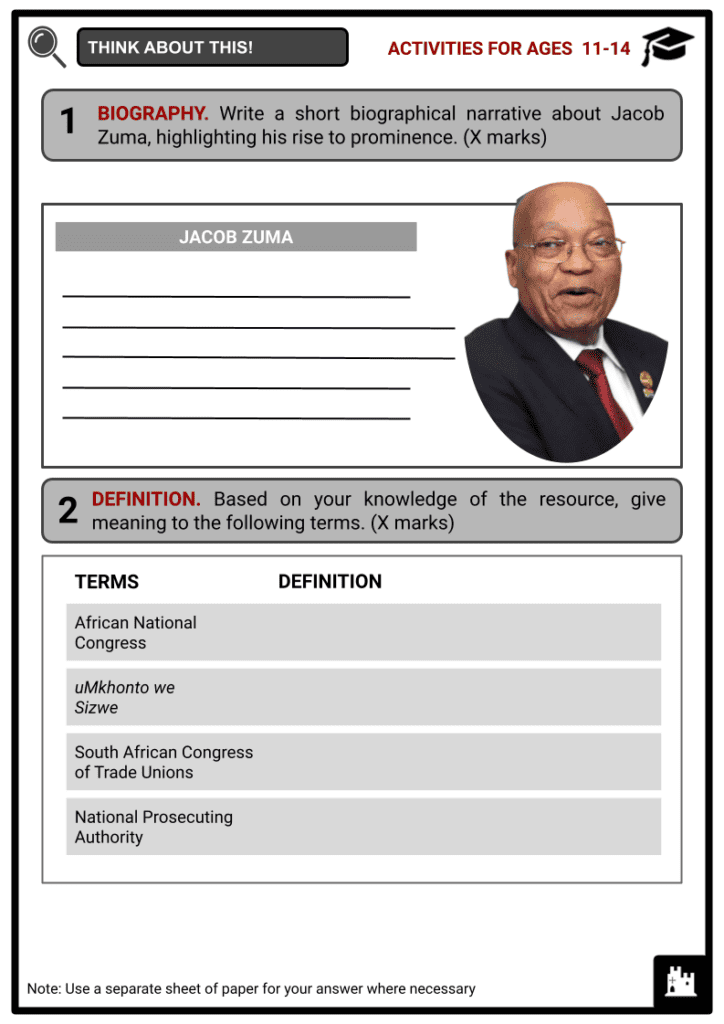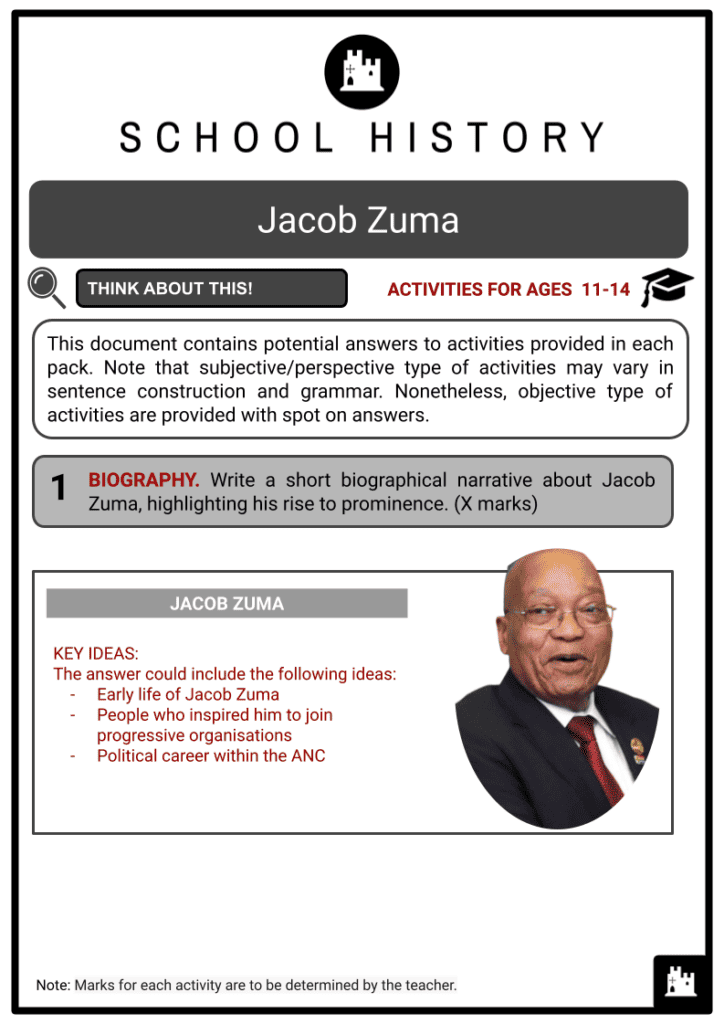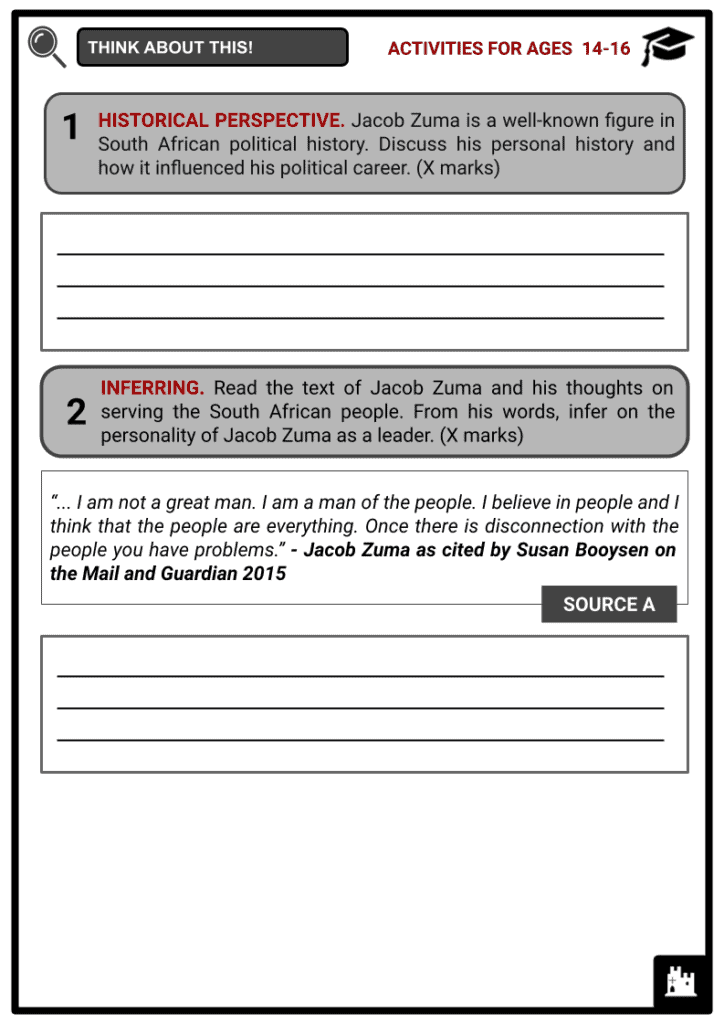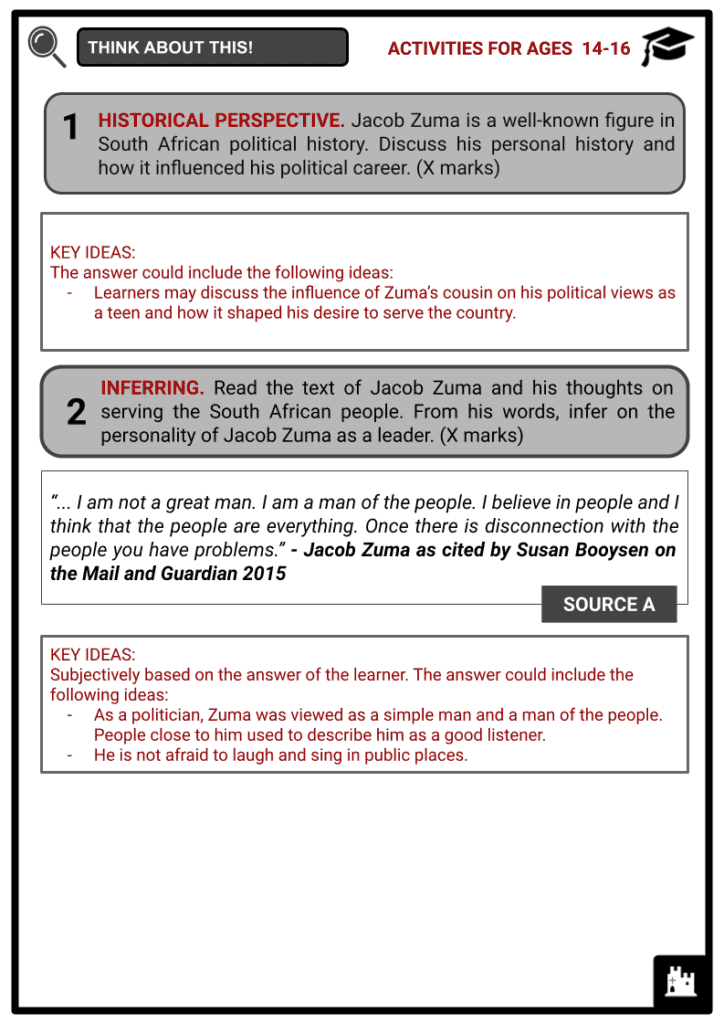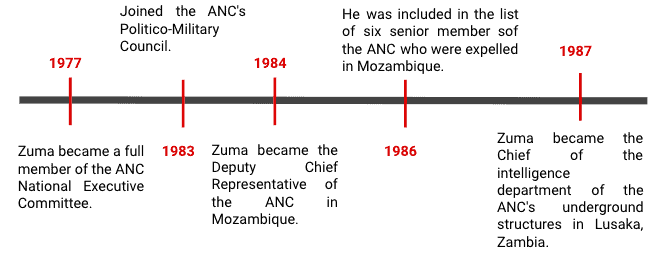Jacob Zuma Worksheets
Do you want to save dozens of hours in time? Get your evenings and weekends back? Be able to teach about Jacob Zuma to your students?
Our worksheet bundle includes a fact file and printable worksheets and student activities. Perfect for both the classroom and homeschooling!
Summary
- Early Life
- Political Career
- Rise to Presidency
- Socio-economic Policies
- Political Issues
- Resignation as President of South Africa
Key Facts And Information
Let’s find out more about Jacob Zuma!
Jacob Gedleyihlekisa Zuma was the former President of South Africa, who served in the office as the fourth President of South Africa from 2009 - 2018. Zuma was a former anti-apartheid activist, a paramilitary group uMkhonto we Sizwe member, and served as the President of the African National Congress (ANC), a social democratic political party in South Africa between 2007 and 2017.
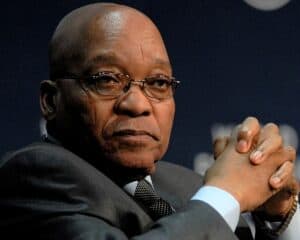
His early political consciousness was shaped by his cousin Muntukabongwa Zuma, who had fought in the Second World War and later joined the trade union movement and the ANC in Durban.
EARLY LIFE
- Jacob Zuma was born in Nkandla, Natal Province, which is currently part of the province of KwaZulu-Natal. Jacob’s father, Nobhekisisa, was a police officer who died when he was five years old, and his mother, Geinamazwi, was a domestic worker. After his father died, he and his mother moved to his mother’s parental home in KwaMaphumulo, Natal.
- After moving to his grandfather’s home, Zuma began herding his grandfather’s cattle while his contemporaries went to school. Geinamazwi had wished to take him back to Nkandla, but there was no school there, so he was left tending the cattle and goats in KwaMaphumulo.
- When Jacob was still young, his mother went to the port city of Durban and found employment as a domestic worker, leaving Jacob and his siblings behind. Zuma learned to read in KwaMaphumulo by browsing through the books of other children who went to school. Zuma did not go to a formal school because of poverty. During his free time, he would visit his mother but was not allowed in the home where she worked.
- As a teen, Zuma was politically influenced by stories of the Bambatha Rebellion, an uprising of the Zulu people against the imposition of a poll tax. The Bambatha Rebellion was one of British colonial rule’s brutal and bloody uprisings.
- However, the most significant influence came from his cousin Muntukabongwa Zuma. His cousin had been a soldier in World War II and later became an anti-apartheid activist. While visiting Cato Manor and Greyville in Durban, Jacob saw ANC volunteers doing political work, and consequently, he began attending the organisation’s meetings too.
POLITICAL CAREER
- Zuma joined the African National Congress Youth League (ANCYL) and the South African Congress of Trade Unions (SACTU) in 1959. Both organisations aimed to end the apartheid system and forward the cause of union members in South Africa. He became an active member of ANCYL and SACTU and attended political education classes in central Durban from 1960 - 1963.
- The banning of the ANC in 1960 led to the formation of its armed wing, uMkhonto we Sizwe (MK). Zuma soon joined MK and became involved with the armed struggle and participated in sabotage actions in Natal.
- As was typical for aspirant MK cadres, he also planned to leave South Africa for military training abroad. During this period, he came under the influence of a relative, Obed Zuma, together with Stephen Dlamini and Moses Mabhida, who were leading figures in SACTU. Zuma began attending evening political classes under the tutorship of Mabhida and Dlamini over three years.
- According to an article by David Beresford published in The Times in 2009, Zuma became an active member of the MK in 1962. In the same year, he was arrested with 45 recruits near Zeerust in western Transvaal, currently part of the North West Province.
- Zuma was found guilty of plotting to destabilise the apartheid regime and condemned to ten years in jail, which he served on Robben Island alongside Nelson Mandela and other influential ANC leaders.
- Zuma re-established ANC underground organisations in Natal after his release from prison. He left South Africa in 1975 and was first located in Swaziland, where he met Thabo Mbeki, an ANC activist who subsequently became South Africa’s second Black President. Mbeki dealt with the entrance of thousands of exiles seeking military training in Mozambique in the aftermath of the 1976 Soweto Uprising.
Brief Timeline of Zuma’s early political career in ANC
- Along with Mbeki, Zuma formed part of the ANC President Oliver Tambo’s negotiation team, which met with the South African government representatives in the late 1980s to early 1990s. Among the first of these meetings, Zuma and Mbeki were present at a meeting arranged by Professor Willie Esterhuyse and a few of his colleagues in November 1987. Several similar meetings followed in which Zuma participated.
- After the ANC was unbanned in February 1990, Zuma returned to South Africa on 21 March to begin negotiations with the government. He was among the first ANC leaders to return to South Africa for talks. Later that year, he was unopposed for the ANC Southern Natal Chairperson position.
- Zuma, as a Zulu, became known as a leading peace broker in Natal during the period’s political violence, which was primarily caused by a conflict between nationalist supporters of the then-Xhosa-dominated ANC and supporters of the Zulu-nationalist Inkatha Freedom Party (IFP). He is also credited with expanding the ANC’s Zulu support base in Natal.
- Zuma ran as the ANC’s candidate for the premiership of his newly formed home province, KwaZulu-Natal, in South Africa’s first democratic election in 1994. In the elections, Mandela was elected President, and Mbeki was appointed Deputy President, but the ANC lost KwaZulu-Natal to the IFP.
RISE TO PRESIDENCY
- Zuma was elected Deputy President of the ANC during the party’s 50th National Conference in Mafikeng in December 1997, and he was subsequently designated Vice President of South Africa in June 1999, pursuant to the 1999 general election results. Zuma served as the principal mediator in the Burundi peace process, working with Ugandan President Yoweri Museveni, who chaired the Great Lakes Regional Initiative, a coalition of regional leaders monitoring the Burundi peace process.
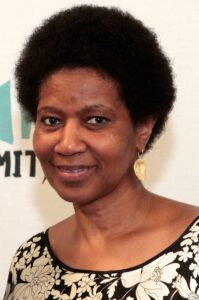
Phumzile Mlambo-Ngcuka - In late 2002, the National Prosecuting Authority (NPA) announced that Zuma was one of several ANC politicians under investigation by the Directorate of Special Operations (DSO), a specialised unit of the NPA of South Africa formed by President Thabo Mbeki. Zuma was investigated for corruption related to the R30-billion Arms Deal, a significant defence procurement package the government signed months after Zuma’s appointment to the deputy presidency.
- In the 2004 general election, both Mbeki and Zuma were re-elected. Nonetheless, Mbeki fired Zuma as Vice President on 14 June 2005, following the conviction of Zuma’s accomplice, Schabir Shaik, for making illegal payments to Zuma in connection with the Arms Deal. Phumzile Mlambo-Ngcuka succeeded Zuma as South Africa’s Deputy President.
- Phumzile Mlambo-Ngcuka has been the minister of minerals and energy since 1999. Her appointment was booed publicly at ANC rallies by Zuma supporters, including at a Women’s Day event in Utrecht, KwaZulu-Natal.
- Soon after Zuma’s dismissal, the NPA announced its intention to instate formal corruption charges against him. Zuma was served with a provisional indictment on fraud and corruption charges in November 2005. However, the NPA was unprepared to serve the final indictment and applied for postponement. The Pietermaritzburg High Court dismissed the application on 20 September 2006, and when the NPA indicated that it was unwilling to proceed with the trial, the Zuma case was dissolved.
- On 18 December 2007, Zuma was elected as President of the ANC at the party’s 52nd national conference in Polokwane, Limpopo. Zuma polled 2 329 votes against his opponent, Mbeki, who received 1,505 votes.
- After Zuma’s election, the NPA served him with an indictment on corruption, fraud and money laundering charges. Mbeki applied to the Constitutional Court to appeal the Nicholson verdict, which the NPA opposed. Zuma also stated that he opposed Mbeki’s application.
- On 20 September 2008, the ANC voted to recall Thabo Mbeki as President. He was succeeded as President of the Republic of South Africa by Kgalema Motlanthe. He held office for approximately seven and a half months. The NPA later withdrew all 16 charges against Zuma in the Durban High Court, paving the way for Zuma to push for the office of state President.
- After the charges were withdrawn, Zuma was elected President of the Republic of South Africa on 6 May 2009. Zuma also took over from Thabo Mbeki as mediator in resolving the Zimbabwe political crises under the banner of Southern African Development Community (SADC), an intergovernmental organisation headquartered in Gaborone, Botswana.
- On 14 January 2014, the ANC announced that Zuma would be their only candidate for the upcoming general elections. On 21 May that year, Zuma was again elected as President of the Republic, beginning a second term. Zuma’s next stint as Head of State continued similarly, with more controversy seemingly following his every move.
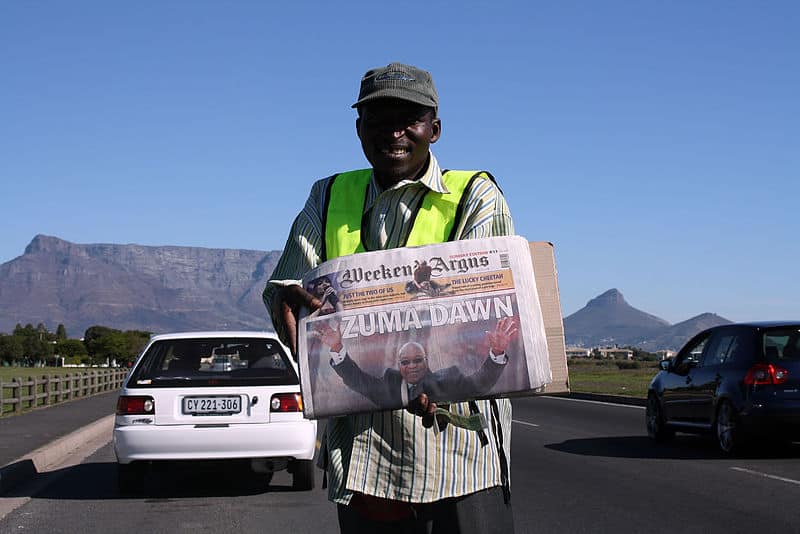
A news vendor displays the headline "Zuma Dawn"
SOCIO-ECONOMIC POLICIES
- When Zuma took office, he established the National Planning Commission under the President, which Minister Trevor Manuel led. Zuma’s cabinet adopted the National Development Plan (NDP), a scheme of organised large-scale expenditure mainly on national infrastructure.
- The NDP sets out the country’s goals by 2030 and builds consensus on the key obstacles to achieving these goals and what should be done to overcome those obstacles. In 2015, during his State of the Nation address, Zuma unveiled his Nine-Point Plan to boost economic growth and create jobs in the medium term. The plan’s components included:
- Resolving the energy challenge
- Promoting private-sector investment
- Revitalising agriculture
- Moderating workplace conflict
- Increasing the value of mineral wealth
- Unlocking the potential of small enterprise
- More efficient implementation of a more powerful Industrial Policy Action Plan
- Boosting the role of state-owned enterprises
- Operation Phakisa, which aims to boost the ocean economy and other sectors
- Aside from advancing economic policies, Zuma emphasised addressing HIV/AIDS-related concerns. According to Statistics South Africa, life expectancy in South Africa has risen from 56.8 years in 2009 to 62.4 years in 2016. Zuma passed policies that have included improving access to and uptake of antiretroviral (ARV) drugs and a widespread HIV Counselling and Testing campaign in South Africa.
- This ARV rollout has also significantly impacted infant and child mortality rates by reducing mother-to-child transmissions. The Office of Health Standards Compliance includes within its auspices the Health Ombud, and the first Ombudsman, Professor Malegapuru Makgoba, was appointed on 1 June 2016.
POLITICAL ISSUES
- Zuma’s second term in the President’s Office has seen him involved in several controversial issues. One major controversy concerns his private home’s costly upgrades in Nkandla, KwaZulu-Natal.
- In May 2009, a security assessment of Zuma’s Nkandla residence in KwaZulu-Natal was done by state security. State security personnel recommend improvements of around R27.9m. In the subsequent years, reports revealed that R203m of taxpayers’ money would be used to revamp the building.
- Public outrage ensued, with the government issuing reports that impropriety was involved. In October 2012, the Public Protector Thuli Madonsela began investigating the publicly funded construction at Nkandla. Zuma addressed Parliament in November 2012 and claimed that the costs of Nkandla upgrades are due to the National Key Points Act.
- The court’s decision that Zuma had failed to defend the Constitution later served as the foundation for an impeachment motion in Parliament, which the Democratic Alliance (DA), a political party and the official opposition to the ANC narrowly lost sponsored. However, Zuma faced severe backlash after the Constitutional Court ruling, including criticism from the South African Communist Party (SACP), civil society, several ANC stalwarts, and several active factions of the ANC.
- Zuma had faced and defeated five resolutions of no confidence in Parliament before the verdict, three of which were put to a vote. Following the ruling and failed impeachment motion, he faced three more in November 2016, August 2017, and February 2018.
RESIGNATION AS PRESIDENT OF SOUTH AFRICA
- On 14 February 2018, the Hawks, South Africa’s elite crime-fighting unit, raided several properties belonging to the Gupta family, who were seen as Zuma’s allies, patrons and allegedly the significant benefactors of the perceived corrupt structures that had been created under Zuma’s presidency.
- The Speaker of the National Assembly, Baleka Mbete, said that the motion of no confidence in Zuma had been pushed up in the legislative timetable and will now be voted on the following day rather than 22 February. The ANC said it would back the opposition’s motion to ensure its passage.
- Zuma appeared on South African Broadcasting Corporation (SABC) live, claiming that all the cases were just allegations and that he was not properly informed on the reasons for his recall. Zuma announced his resignation in a live televised address shortly before 11 p.m. on the same day.

